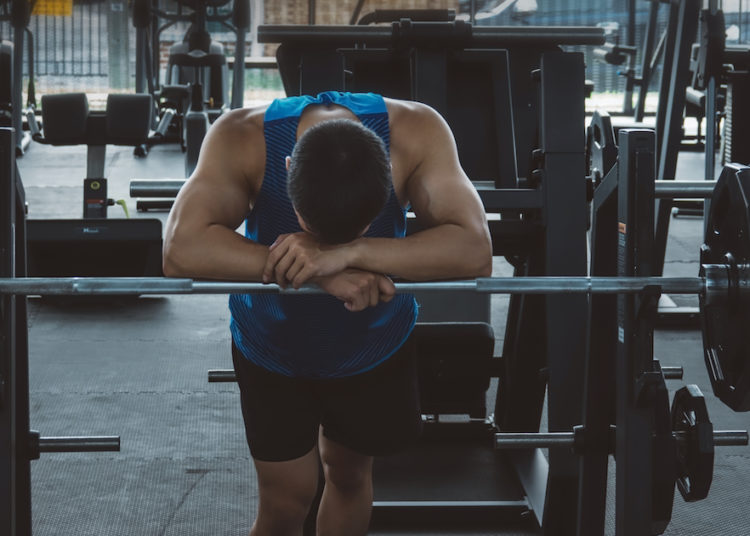When your lifting is an integral part of your physical and mental health routine, it can be all too easy to slip into overtraining. Especially when stress levels are high, it’s easy to go too much, too hard, too fast. If your energy levels are taking an unexplained dip — I’m working out more than ever, you say, so I should be feeling great! — you might be overtraining during the pandemic.
External Stress + Training Intensely Can Lead To Overtraining
Even if your lifting life feels fine — maybe you’ve got a new running routine down during quarantine, or you actually managed to snag a few kettlebells and dumbbells before they evacuated the face of the earth — the pandemic has certainly brought more than a little bit of external stress into your life.

[Related: 4 ways to naturally improve circadian rhythm]
When general life stress levels skyrocket, so does the likelihood that you’ll overdo it with your workouts. Let’s dive into how you can recognize if you’re training too much.
Overtraining During Quarantine
Exercise stress is… still stress, even though it feels excellent in the moment. When working your body to the max, it needs to recover well — otherwise all your stressors can add up and cause a dip in your mental and physical performance (not to mention your energy levels and mood).
To properly recover from all stress — including your workouts — you need a load of sleep, to eat well (and enough), and to move your body gently with even simple things like walking around regularly. Maybe under normal circumstances, you can do all or most of those things pretty well. But the pandemic is not a normal circumstance, and it’s very likely that your sleep, eating, and non-workout moving habits are way off kilter — not to mention your overall angst levels are probably much higher than usual. Combine it all, and it’s a recipe for overtraining.
View this post on Instagram
Stress and anxiety levels during quarantine are super high for most (if not all) people. If you’re already prone to anxiety, the pandemic probably isn’t helping at all. On top of all that, you’ve suddenly lost the ability to train with all the equipment your heart desires at your gym.
Without being able to dive into your regularly scheduled lifting sessions, you might be turning up the heat at home with whatever bodyweight, kettlebell, or dumbbell workouts you can find. Especially since non-exercise stress levels may already be sky-high, you’re more likely to give your body too much stress to deal with when you run yourself ragged trying to overcompensate every day for your lack of barbells.
Anxiety And Overtraining
When your anxiety levels are high, exercise can be amazing — but it can also aggravate your mental health if you’re not doing something to modulate your stress levels. According to a 2018 study published in the journal Frontiers in Psychology, the higher your baseline anxiety level, the more likely you are to overtrain. (1)
So if the stress of quarantine is raising your usual anxiety levels, it might be taking a lot of the effectiveness out of your workouts and piling even more stress onto your body when it can’t properly recover.
Muscle Growth And Overtraining
Not only will overtraining make you much more mentally fatigued on a day-to-day basis, but it’s also going to put a strong ceiling on your performance level. In a 2018 study from the Journal of Science and Medicine In Sport, researchers examined the growth hormone levels of 51 participants, some of whom were in a state of overtraining; others were healthy athletes; and the third group was healthy but non-active folks.
Subjects who were overtraining had less growth hormone in their bodies than folks who were exercising healthily — in fact, overtraining reduced growth hormone levels down to about the same level as participants who didn’t work out at all. (2)
View this post on Instagram
If you’re working out so much that you’re overdoing it, growth hormone is probably something you want to maintain at decently high levels. Overtraining seems to cancel out that particular benefit of training, meaning that you’re not going to make your muscles any bigger or stronger by pushing your body past its limits without proper recovery day in and day out.
When you’re putting your body through so much strain and it can’t really recover, it’s going to put its energy into maintaining your health as much as it can — muscle growth becomes much lower on the list of priorities. That’s not a recipe anyone wants, especially during quarantine when you’re probably already worried about losing your regularly-scheduled gym gains.
How To Avoid Overtraining During The Pandemic
Avoiding overtraining is much easier said than done — but it’s definitely doable. If you’re feeling your performance plateauing, or you’re training a lot, but finding yourself more irritable or depressed than usual, you’re likely experiencing overtraining. If you’re already there, reign it in. If you’re trying to prevent it, reign it in. It’ll be hard at first to wrap your head around the “less is more” mentality, but it’ll help in the long run.
Listen To Your Body
You know what your body feels like when you’re crushing it in your workouts — making fairly solid gains and improvements each week, and feeling motivated to get after it most, if not all, days. You’re drained after your workouts, sure, but you’re feeling mentally stoked and ready to go at it again. Maybe you’re the type that never gets sore during these periods of awesome sessions, or maybe you know that your body tends to get super sore but you just keep coming back stronger. You know your own body’s rhythms — try to remember what your best training weeks and months have felt like.

Then ask yourself how your body feels now. Are you training all the time, but starting to dread it? Are you working hard, but you’ve stopped making progress? Maybe you’re more sore and stiff than usual, or maybe you’re extra depressed and on edge. It could be the regular old pandemic blues — but if these blues feel tied to your workouts, chances are you might be overtraining.
Even if you don’t feel like you’re even training that much compared to what you’re used to in the gym, remember that your body is probably experiencing much more stress than usual right now, which can lower the threshold for putting your body into damaging overdrive. Check in with your body and mind to see where you’re at.
Take A Few Days Off
No strength athlete ever wants to hear that they should take a single day off, let alone a few, but if you’ve been putting your body through the ringer with no opportunity for recovery, giving yourself at least a few days’ break is likely to help.

You won’t lose all your gains in a few days — and, if you’ve been overtraining, you weren’t making actual gains anyway. Try to think about the long game, and schedule these days off as part of your program. Your body will thank you, and so will your mindset.
Switch Up Your Training
You probably don’t have to stop whatever you’ve been doing that’s made you dip into overtraining, but switching some workouts into a different modality will bring a lot of benefits. Swap out a lifting session or two per week — or just abbreviate them — and put a solid yoga session or two in its place.
Focus on your mobility and active recovery, not just once, but as a regular part of your training program. That will help you feel better from this current overtraining, and help prevent the syndrome in the future. Don’t underestimate the benefits of a good long walk or a solid yoga session — your body needs them to keep you well-balanced. The more balanced you are, the better, more sustainable lifter you’ll become.
Prioritize Recovery
If you’re stuck in the apartment more often than not, it can be hard to maintain a solid sleep schedule, let alone a decent eating routine. Since you can’t magically take away the stress that comes from the world being on fire, focus on the things you can control. See if you can integrate meditation and light yoga into your evenings to encourage yourself to form and stick to a solid, relaxed bedtime.
Try to plan your meals around your workouts — just because you’re not commuting to the office anymore doesn’t mean meal prepping won’t still benefit you. Integrate recovery habits into your newish daily routine — including getting up from your makeshift desk and stretching at least a few times a day — and you’ll be fighting overtraining without even realizing it.
Feel Your Best During Quarantine
It can be incredibly hard to feel like you have control over much of anything during the pandemic; and it might be tempting to try to exercise the stress away. MYes, You Might Be Overtraining During The Pandemicake sure your quarantine workouts are layered with healthy, regular doses of recovery and self-care so you can avoid overtraining and lift your best during the pandemic.
References
- Gaelle Tanguay, et al. (2018) Anxiety and psycho-physiological stress response to competitive sport exercise. Frontiers in Pyschology doi: 10.3389/fpsyg.2018.01469.
- Flavio Cadegiani, Claudio E. Kater. (2018) Hormonal response to a non-exercise stress test in athletes with overtraining syndrome: results from the endocrine and metabolic responses on overtraining syndrome. Journal of Science and Medicine in Sport. doi: 10.1016/j.jsams.2017.10.033.